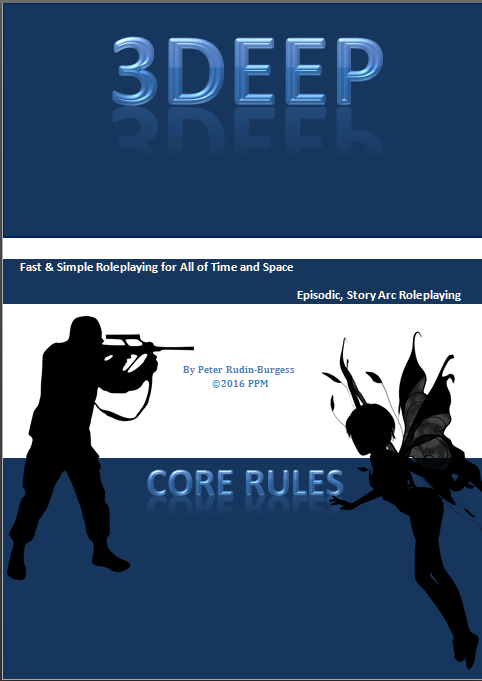(40 page PDF) $4.99
secure checkout from RPGNow
About 3Deep
Fast
3Deep is very fast to play. There should be virtually no stopping for rules look ups. We try to keep everything you need on the character sheet.
Simple
We have used the same mechanic for almost everything, roll your 2d6, add any stat bonus, add any skill and take away any difficulty factors. If the result is 8+ then you succeed. We try and keep as much information on the character sheet as possible so you don’t have to constantly refer to the rule book.
All of Time and Space
All weapons and armour are described in terms of their relative weights, materials and design. Where and when they are made doesn’t really matter. A rapier is a light weapon so it is going to do 1d6 of damage, a blaster rifle is a bigger beast and does 2d6. A tripod mounted machine gun deals out 3d6. The same principles apply to armours, the idea of light through to heavy. The best high tech armour of course performs a lot better than medieval platemail even if they are both ‘heavy’.
With 3Deep you can just as easily play a space opera set following a homer-esque odyssey, a teenage scuby gang battling vampires or one of Arthurs knights searching for Morgana. The rules can handle all of these settings with equal easy.
Episodic
Episodic role play implies some kind of regular reset between adventures or sets of adventures. Wounds heal in hours and days, not weeks and months. 3Deep puts little emphasis on equipment lists. You rarely see characters in TV series carting huge backpacks full of equipment around with them. The plot tends to provide what is required whether it is a gadget from the bat cave or a closet full of crossbows and wooden stakes. 3Deep is also played in ‘scenes’ so it is perfectly acceptable to fast forward from one location to the next without having to role play 60 days at sea or taking the metro across town. If it adds nothing to the story then those scenes end up on the cutting room floor.
Story Arc Roleplaying
Adventures or episodes do not have to be totally discrete, there should be a thread that runs through them, the dastardly villains plot to take over the world or Morgana’s attempts to subvert the kingdom of Camelot. Every character starts with a number of motivations as to why they are who they are and these get woven into the game. Over time they may resolve some or all of these story arcs and at the same time gain new ones.
Play with a GM and Friends or Play Solo
Nearly all role playing games are designed to be played with one person and the Game Master [GM] who creates the game world, creates the story hooks and plays all the other characters in the world. The other players control one character each and the game evolves through the interaction of the characters interacting with this imaginary world, the players describing their actions and saying what their character says and the GM describing the consequences of those actions and so the story moves along. 3Deep has another option built in.
Solo Role Play
When you are on your own you can still play 3Deep. You create a character you want to play and imagine them in the opening scene of your choice. You then ask yourself a question that has a yes/no answer. Just using common sense (for the world you want to play in) decide how likely the question is be yes, roll 2d6 and add a likelihood modifier and the dice will give you a yes/no answer or something similar. Roll a double, two ‘2’s for example and something unexpected happens and a few dice rolls will give a big hint to what it is. you then have to choose what that hint means, again using common sense for that world. Generally what pops into your mind first is what you should go with.
That can sound very vague and confusing at first but in practice it can get very quick and natural. Imagine your character (a knight of the round table) wakes up in a pitch black room, no idea where they are or how they got there. “Can I see any signs of a door?”. Few doors fit perfectly and we have all seen light coming from underneath so that is pretty likely, you roll the dice and the result says ‘Yes’ your character can tell there is a door into the room by the flickering light of a torch or lantern coming under the door. Wondering a bit more about how he got here and where here is…”Can I hear anyone talking beyond the door?” and so on. The story builds upon the questions you ask and how they fire your imagination. A twist may tell you to introduce a new character into the story and it is down to you to decide what is the most logical way to add a new character. Is there someone else unconscious in the room with you? Are they another knight?
Creative Writing
Solo role play can be used to create storys or even entire novels where the writer had no idea who the cast is or where the story will end when they take that first step on their adventure. You just need to write down what you see in your mind’s eye.
